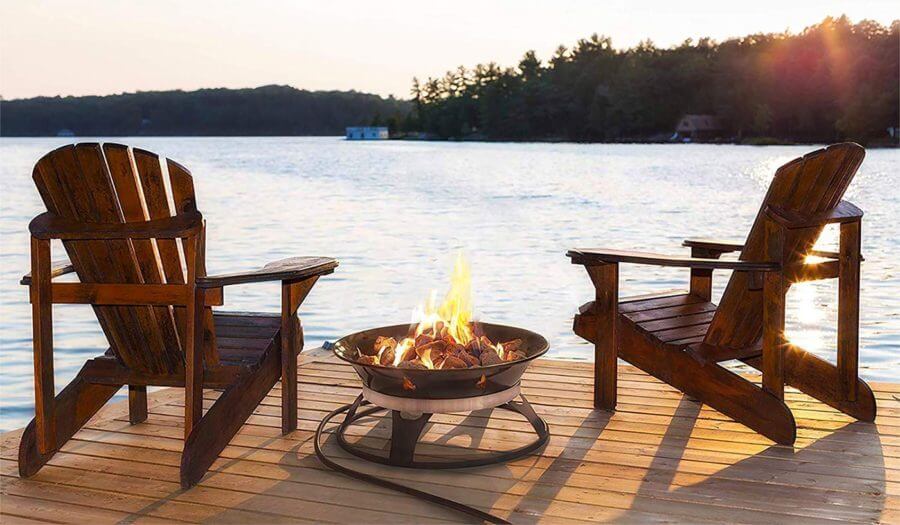The current wave of wildfires spreading throughout the country serves as an important reminder that small sparks can quickly turn into out-of-control flames. RV Fire Safety is very important.
While many wildfires are caused by lightning and dry conditions, others can stem from seemingly harmless human actions. California, Oregon, and Colorado have all experienced destructive fires, resulting in losses of homes, land, and lives, and many areas are continuing to order evacuations.
Seeing as how RVers love whisking away to nature and lounging around the campfire, this seems like a good time to take a few minutes to brush up on some general fire safety tips. As wanderers of the road, we can all do our part in preventing fires from damaging the regal forests and scenic hidden gems that warmly welcome travelers looking for an escape.
To minimize fire risk, here are a few tips to keep in mind:
RV Fire Safety Tip 1- Make Sure You Have a Working Smoke and CO2 Detector In Your RV
Regularly testing your smoke alarms, carbon monoxide detectors, and propane/gas detectors can ensure you’ll be alerted if something was smoking/ catching on fire or if there were any dangerous leaks. Routinely testing these alarms, especially before leaving for a trip, is a good idea, and it’s always smart to bring extra batteries along just in case one does go out. Additionally, be sure to read the manufacturers’ recommendations to see how often it is necessary to replace the entire alarm.
RV Fire Safety Tip 2- Have an Emergency Exit Plan in Place
Your motorhome should come equipped with egress windows that serve as emergency exits, and some also have ceiling vents that function similarly. Before hitting the road, make sure you and your passengers know where these are and how to operate them. It’s also a good idea to come up with an emergency escape plan and practice it so that everyone knows exactly what to do in case of an emergency.
Additionally, having an emergency communication device, such as a satellite messenger, can give you peace of mind knowing that you can call for help even in remote areas with poor or non-existent cell phone reception.
RV Fire Safety Tip 3- Keep Several Fire Extinguishers Scattered Throughout Your RV
Keeping several fire extinguishers dispersed around your RV is a good way to ensure one will always be accessible. Most RVers keep one in the kitchen, one in the bedroom and/or bathroom, and one located in an area outside of the RV, such as in the trunk of a car or in an outdoor storage box.
Additionally, it’s important that you and all passengers who are old enough know how to use one. If a fire occurred, you don’t want to waste valuable time reading the instructions, so take time to educate yourself before a problem occurs.
RV Fire Safety Tip 4- Inspect Your RV for Safety Hazards
It’s important to always inspect your RV for safety hazards before embarking on any trip, or if you’re not mechanically inclined yourself, take it in for a professional to look over.
Loose electrical connections, poor tire health (relating to bearings and tire pressure), dirty engine components, friction caused by brake drag, and leaking fluids are all potential fire hazards. The good news is that you can keep you and your passengers safer by making sure your RV is well-maintained and in top shape before hitting the road.
RV Fire Safety Tip 5- Be Careful When Using Propane
Propane is a highly flammable substance, so it is advised not to drive with the propane turned on (though you’ll find the RV community is divided on this issue, most agree it is the best option when erring on the side of caution). Additionally, shutting the valve when you’re not using the propane is a good idea, as is having a certified professional inspect your propane system for leaks before taking off for your adventure.
RV Fire Safety Tip 6- Park Your RV Mindfully
When driving long distances, the underside of your RV can get extremely hot. Because of this, it is important to pay attention to where you park so that you don’t park directly over dry brush or other material that could start on fire.
RV Fire Safety Tip 7- Don’t Leave Your Cooking Unattended
Whether you’re cooking on your stove or on a campfire, don’t leave your food unattended. It’s a pillar of fire safety that you’ve most likely heard over and over, but it bears repeating for a reason. Things can happen in a split second, so take this one to heart and keep your eye on the tasty cuisine you’re putting together.
RV Fire Safety Tip 8- Practice Safe Campfire Habits

It’s hard to think of a more quintessential image that captures the joy of the outdoor lifestyle than one of friends and family sitting around a cozy campfire. That being said, it’s important to make sure any campfire you enjoy is managed in a fashion that emphasizes the best safety measures, such as:
- Stay aware of and abide by any fire bans or restrictions. Before you consider making a fire, make sure that the area you’re in does not have an active camping ban in place, and if staying at an RV park, it’s a good idea to make sure the owner allows fires at all.
- Keep the fire a healthy level away from your RV awning. When building your fire, try to build it a good distance away from anything flammable, including your RV awning. If your RV awning were to get too hot, it could become discolored and warped. Even more alarming, a flying ember could burn holes in the awning canopy fabric or even cause the fabric to start on fire, which could spread to the RV itself.
- Monitor for strong wind. Strong winds can fuel the fire and blow embers out of the firepit, increasing the likelihood that nearby brush or your RV/awning will catch on fire. If winds are expected to be intense, it’s a good idea to wait to build your fire until after the dust settles.
- Don’t leave a fire unattended. Fire can spread rapidly, so always keep an eye out for loose sparks and embers, changing weather conditions, etc.
- Keep it small and manageable. The smaller your fire is, the easier it will be to manage. A large fire is more likely to grow out of control, so avoid bonfire-size flames and stick to small ones that are still able to get that marshmallow perfectly roasted.
- Clear any flammable material away from the area. Because embers can fly out, it’s important to clear the surrounding space of flammable items and debris.
- Make sure the fire is fully extinguished before leaving the fire. Never go to bed or leave your campsite if the fire is still going at all, even if the embers are only crackling or there is only a bit of smoke rising. Winds can easily spark the fire back up, so make sure it is completely out and the inside of the pit has cooled off. Pouring a generous amount of water on the pit, stirring it with a shovel, and pouring more water on the ashes will help you extinguish it from all sides.
RV Fire Safety Tip 9- Don’t Overwhelm Electrical Circuits in Your RV
Avoid using power strips or extension cords, as these can overwhelm your RV’s electrical circuit. If you have to use an extension cord, make sure it is high quality, and never plug in anything that exceeds the capacity of the extension cord.
RV Fire Safety Tip 10- Only Use Electric Heaters That are Safe for Indoor Use
If you plan on doing some cold-weather RVing and keeping warm with an electric heater, find one that is safe for indoor use and has an automatic sensor so that it will turn off in case it gets tipped over. Keep flammable objects at least three feet away from it, and avoid keeping it on when you are away from your RV and when you go to sleep.
RV Fire Safety Tip 11- Don’t Smoke Indoors, and Never Throw Cigarette Butts on the Ground
Many fires have started with a cigarette falling to the carpet or on dry brush outside, so make sure you ash in and dispose of cigarette butts in a heavy-duty ashtray rather than on the ground.
Fire isn’t the only risk RVers face. Here are 10 Tips for Safe RVing During Hurricane Season
Closing Up
Hopefully, these tips help you see how you can minimize your fire risk while RVing. Prioritizing safety is the best way to prevent any stressful situations from putting a damper on fully enjoying your RV adventures. Additionally, these safety measures also work to protect your loved ones, your RV, and the beautiful surroundings that make RVing such an awe-inspiring way to see the world. Happy trails!
*Please keep in mind that this article is meant to provide general fire safety tips and is not meant to function as professional RV maintenance or fire safety advice.
